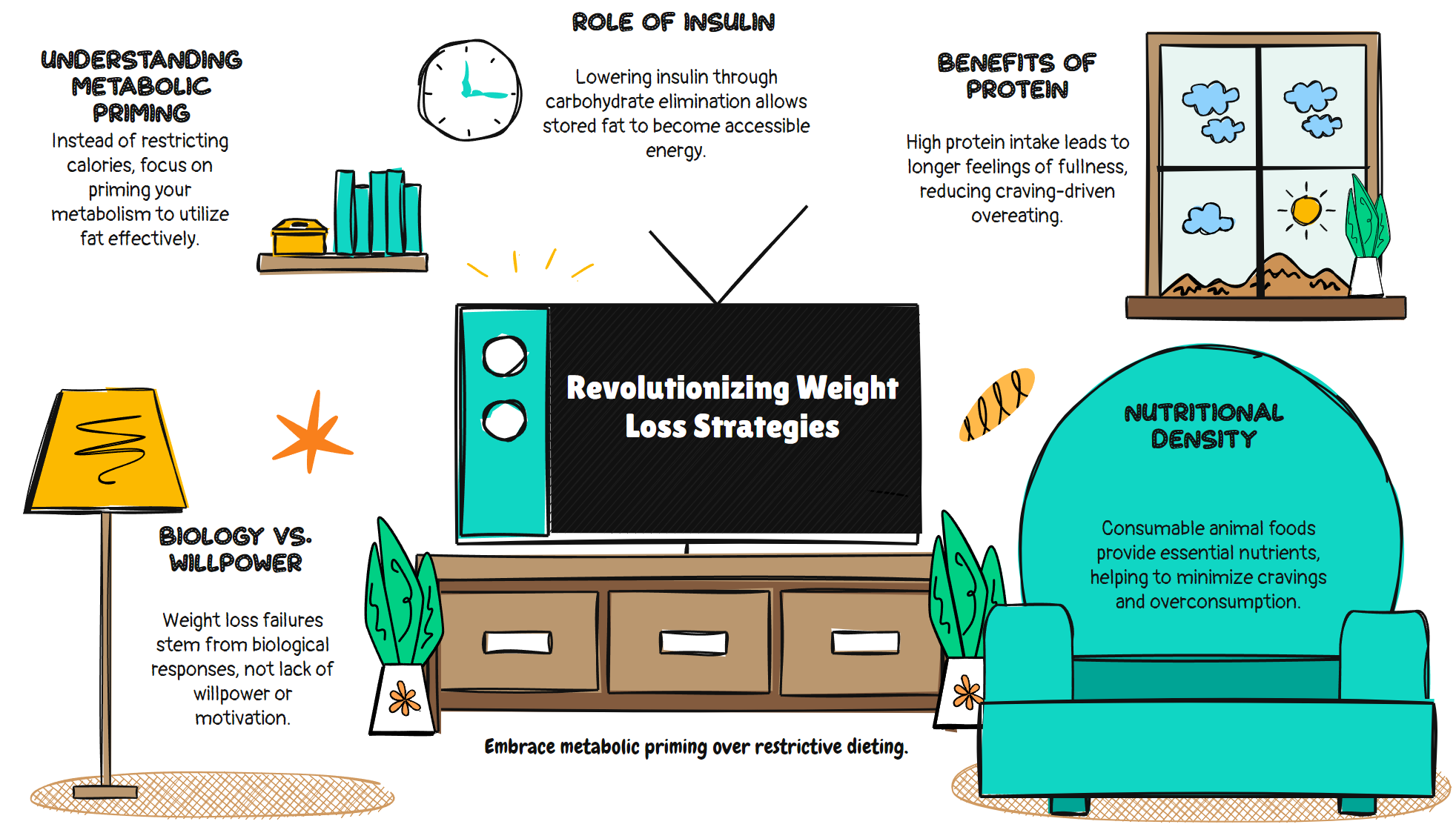
Why Your Body Fights Traditional Diets And How Carnivore Changes The Game
Why Your Body Fights Traditional Diets And How Carnivore Changes The Game
Most weight loss fails. Not because people lack willpower, but because they're fighting biology with the wrong weapons.
The conventional wisdom has always been simple: eat less, move more. Create a caloric deficit and watch the pounds melt away. Yet despite this seemingly straightforward equation, obesity rates continue climbing while success rates of traditional diets remain dismally low.
What if we've been thinking about weight loss all wrong? What if restriction itself is the problem, not the solution?
The Biological Rebellion Against Restriction
When you restrict calories, your body doesn't thank you. It panics. Evolutionary programming kicks in, interpreting your diet as a famine. Your metabolism slows. Hunger hormones surge. Stress hormones rise. Your body essentially mounts a biological rebellion against your conscious efforts.
This isn't a failure of willpower. It's physiology.
The restriction model creates a fundamental conflict: your conscious mind wants one thing while your body fights for another. This internal war explains why initial weight loss often reverses, leaving dieters heavier than when they started.
Priming vs Restricting
The carnivore approach offers a fundamentally different paradigm. Rather than focusing on restriction, it emphasizes metabolic priming.
Priming means preparing your body to efficiently use its own fat stores by shifting your metabolic machinery. Instead of creating an energy deficit your body resists, you're changing which energy source your body prefers to use.
The distinction is subtle but profound:
Restriction tells your body: "Energy is scarce, conserve and store."
Priming tells your body: "Energy systems are changing, adapt and thrive."
This shift transforms weight loss from a battle against biology into a cooperative venture with it.
How Carnivore Creates Metabolic Flexibility
The carnivore diet works primarily through several biological mechanisms that traditional diets often ignore:
First, by eliminating carbohydrates, it drastically reduces insulin levels. Insulin is essentially a storage hormone that locks fat in your cells. When insulin drops, stored fat becomes accessible fuel.
Second, protein satiety signals are stronger and longer-lasting than those from carbohydrates. You naturally eat less without feeling deprived because protein triggers different feedback mechanisms in your brain.
Third, the carnivore approach eliminates most food reward triggers that drive overconsumption. Modern processed foods are specifically engineered to override natural satiety signals. Animal foods lack these hyperpalatable qualities.
Fourth, nutritional density increases dramatically. Your body receives abundant essential nutrients with fewer total calories, reducing cravings that often derail traditional diets.
The Hormonal Reset
Beyond simple calorie math, the carnivore approach addresses hormonal factors that traditional diets ignore.
Leptin resistance often develops in overweight individuals. Leptin signals satiety, but when cells become resistant to its message, hunger persists despite adequate energy stores. The carnivore approach helps restore leptin sensitivity.
Ghrelin, the hunger hormone, normalizes on a carnivore protocol. The constant hunger that plagues many dieters diminishes as hormonal signals realign with actual energy needs.
Cortisol, the stress hormone that promotes abdominal fat storage, often decreases as blood sugar stabilizes. The constant glucose roller coaster that drives cortisol production flattens out.
This hormonal recalibration means your body starts working with you rather than against you.
Beyond Weight Loss
The carnivore approach often delivers benefits beyond simple weight reduction. Many practitioners report improved mental clarity, reduced inflammation, better sleep, and more stable energy levels.
These additional benefits create a positive feedback loop. When you feel better, you move more. When inflammation decreases, exercise becomes easier. When sleep improves, stress hormones normalize further.
The traditional restriction model creates a negative spiral: more hunger, less energy, increased stress, and poorer sleep. The priming approach reverses this pattern.
The Practical Implementation
Adopting a carnivore approach doesn't require counting calories or measuring portions. The focus shifts to food quality rather than quantity.
Start by eliminating processed foods, sugars, and grains. Focus on nutrient-dense animal proteins and fats. Let hunger be your guide rather than external rules about when and how much to eat.
The initial adaptation period requires patience. Your body needs time to upregulate fat-burning enzymes and downregulate sugar-burning pathways. This metabolic shift typically takes between two and six weeks.
During this transition, electrolyte management becomes crucial. Sodium, potassium, and magnesium needs change as insulin levels drop. Addressing these needs prevents many of the symptoms people mistakenly attribute to the diet itself.
Not a Universal Solution
No single approach works for everyone. Individual factors including genetics, gut microbiome composition, activity levels, and health history all influence how someone responds to any dietary protocol.
The carnivore approach offers a powerful alternative to the failed restriction model, but it requires personalization and sometimes professional guidance, particularly for those with existing health conditions.
What makes this approach valuable isn't that it's perfect for everyone, but that it challenges the fundamental assumption that weight loss must involve fighting your body rather than working with it.
Rethinking Success
The ultimate goal isn't just weight loss but sustainable health improvement. The carnivore approach prioritizes hormonal healing and metabolic function over simple scale victories.
When your body is properly primed, weight management becomes less of a constant struggle and more of a natural outcome of restored health.
The question shifts from "How do I lose weight?" to "How do I restore my body's natural ability to maintain a healthy weight?"
This paradigm shift might be the most valuable contribution the carnivore approach offers to our understanding of weight management. It suggests that our bodies aren't broken or lazy. They're responding exactly as they should to the signals we're giving them.
Change the signals, change the response.
